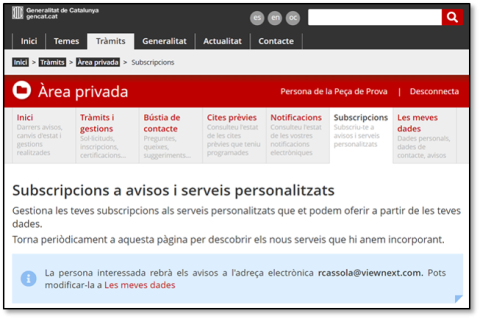Proactive service for University Grants Applications - Catalonia
Catalonia ()
The Beca Equitat (Equity Grant) is a type of university scholarship awarded annually by the Government of Catalonia and aims to help people with fewer economic resources to access university studies and to guarantee equal opportunities in higher education.
To save citizens having to worry about the dates of the calls for applications, it has been created a system of subscriptions to proactive and personalised alerts, so that those who register will receive an email when there is a new call for applications. Furthermore, students who have applied for grants in previous years will find the form already filled in, so they only have to check the data and confirm them, or enter only the ones that have changed.
In this way, for example, a student who has applied for a grant this summer will only have to open the email, click on the link to enter the form and confirm the data.
For the service to work, the person must be digitally identified through systems such as idCATmòbil, the Catalonia’s citizen easy-to-use authentication and electronic signature service. Users can register to use idCATmòbil online or by video identification, with no need to visit a government office in person.
The service is not therefore fully proactive because of legal obligations and challenges related to data quality. According to Spanish law, the user must sign every application and the risk of data imperfections is still present. For the design of the service, and to comply with privacy rules, the Government needed to ask for consent to send the related alert and reuse the data from the previous application. For this purpose, a centralised consent register was built and made available in each citizen’s private folder in the Catalan portal.
The project was carried out in a partnership between the Agency for Management of University and Research Grants, AGAUR (Ministry of Research and Universities) and the Ministry of the Presidency.
On another hand, for the design of the service and to comply with privacy rules, the Government needed to ask for consent to send the related alert and reuse the data from the previous application. For this purpose, a centralised consent register was built and made available in each citizen’s private folder in the government website. This also meets the objective of preserving the protection of personal data and privacy (3.7).
In addition, the service offers a pre-filled form to users, which is in line with the goal of the reduction of administrative burden (3.3). This approach ensures that the service is easy to use and minimizes the effort required of users to complete the necessary paperwork. The pre-filled form also ensures that users are not required to provide redundant information, which can be frustrating and time-consuming. All this is also related to the will to promote digital interaction with the administration (3.1, 3.4), which is a non-mandatory option, but at the same time offers incentives for digital service use, since by processing virtually one can benefit from the pre-filled form and proactive alerts.
Also, the service is personalized, this approach ensures that users receive information that is relevant to them and tailored to their individual circumstances. This personalized approach helps to build trust and confidence in the service and increases user satisfaction. Also, the change from a PDF form to HTML facilitates the accessibility, security, availability and usability of the procedure (3.2).
Overall, the university grant alert service developed by the Goverment of Catalonia is a great example of a user-centric service that prioritizes the needs of its users. The service is anticipatory, proactive, simple, intuitive, and personalized, all of which are essential principles of user-centricity.
On the other hand, from the citizen's perspective, the service has served to simplify and facilitate the processing of university grants. This is demonstrated by the AGAUR satisfaction surveys, with a very positive assessment of the service, with 83.65% of users finding it very useful, and an overall assessment of proactivity of 87.51% who consider it to be good or very good. In addition, 88.22% said they had used the pre-filled form and 57.97% said they had subscribed to more procedures.
Both citizens and the administrative units involved in the procedure and in the corporate management tools participated in the co-creation. With regard to citizens, two sessions were held with 10 citizens to firstly learn about the pain points of the procedure and then to validate the prototyping of the improvements.
